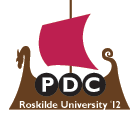| EXPL PAPERS | WEDNESDAY 15:30-16:30 | SMALL AUDITORIUM |
Continuing Design
Session chair: Yvonne Dittrich, IT Univeristy of Copenhagen
Simple conversational practices in the case of free and open source software infrastructure
Giacomo Poderi, University of Trento
Abstract. The aim of this paper is to provide insights on how the infrastructure of a Free and Open Source Software (FOSS) project is used by the participants while they bring forward their own contributions. Specific case used for this paper is a mature development project of a video game. Several discussions were collected from the development board of the project's Internet forum and analysed through the inductive and iterative process of the Grounded Theory methodology. The paper identifies the emerging conversational practices of positioning, linking the scattered, setting a positive atmosphere, constructing citizenship and it discusses them in relation to the distributed nature of the project.
Empowering users to become designers: Using meta-design environments to enable and motivate sustainable energy decisions
Holger Dick, University of Colorado Boulder
Hal Eden, University of Colorado Boulder
Gerhard Fischer, University of Colorado Boulder
Jason Zietz, University of Colorado Boulder
Abstract. Unsustainable energy consumption is a systemic problem facing societies. While technological innovations are necessary to address this problem, they are not sufficient; they need to be integrated with social and behavioral changes in order to be most effective. Our approach is based on understanding and using participatory design as a paradigm for software design as well as the foundation for socio-technical environments that enable and support a cultural shift from passive consumers of energy to active decisions makers. Our research is grounded in two theoretical frameworks, meta-design and cultures of participation. We are developing EMPIRE, a socio-technical environment supporting rich ecologies of participation that enable people to become active designers of their energy consumption. EMPIRE engages people to participate in the design of their own energy environment and supports individuals and communities in understanding and making more sustainable choices regarding energy.
Infrastructuring for opening production, from participatory design to participatory making?
Anna Seravalli, Malmö University
Abstract. Fabriken is a makerspace, a public workshop equipped with tools and machines that can be used to make (almost) anything: from fixing a flat tire to build a robot, from backing to meet new people. This space has been set up with the aim of opening production, to investigate what happens when means of production are made public and when people make things together by sharing facilities and skills. From a participatory design perspective the making of Fabriken can be understood as process of design-for-design and infrastructuring. The paper discusses how Fabriken came to be and how, in looking for a strategy to design-for-design and infrastructuring, there has been a shift from a design-before-use to a design-in-use approach, where the tactics of events, small-scale interventions and long-term engagement have been used to foster a process of participatory making of the space.
Participatory maintenance-in-use. Users' role in keeping systems alive
Mario Marcolin, University of Trento
Vincenzo D'Andrea, University of Trento
David Hakken, Indiana University
Abstract. Based on a case study of the implementation of an Italian Regional Welfare Information System, this paper introduces the concept of maintenance-in-use as a complement to that of design-in-use. Our observation of the co-ordination of diverse professionals in and out of multiple workplaces and acknowledgement of the importance that this has for keeping systems alive suggest a need to expand the analysis of post-implementation participation. The concept of ‘maintenance-in-use’ supports shifting attention from the issue of infrastructure enhancement to the social aspects of Information Systems at work, making it a central part of research to achieve Socially Robust and Enduring Computing.
